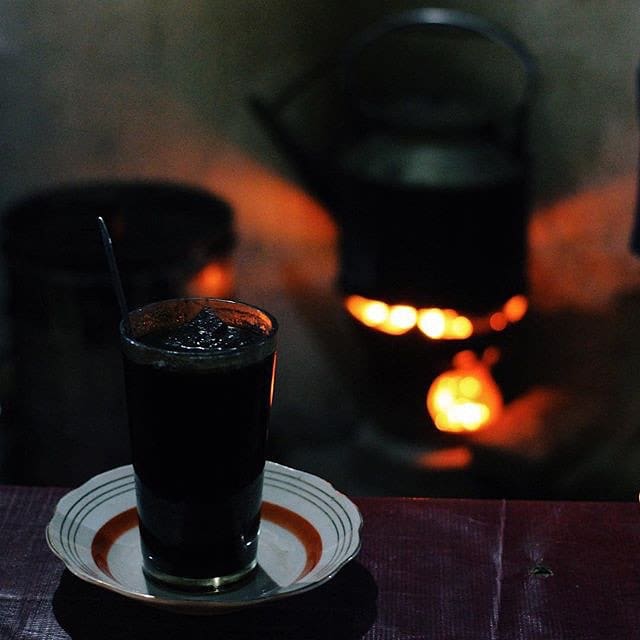With a small amount of money, Lita Anggraeni, Aida Milasari, Damairia Pakpahan, Maria Pakpahan, Siti Noor Laila, Heningtyas Sutji and Rebeka Harsono, in 1991, they were still students, often meeting in Sagan, Yogya.
Sagan is a “headquarters” for those who are members of the Yogya Women’s Discussion Forum (FDPY).
In Sagan, they often discuss issues of class, women’s issues, feudalism, gender bias, and working women, about how domestic work is valued and taken into account. These discussions then made them feel that there was a fate that was not in favor of workers and domestic workers (PRT).
At the same time, there was a case of violence in Ngawi, East Java that happened to a domestic worker, Kamiyatun, who was abused by her employer. From the case of Kamiyatun, they then share the tasks. Heningtyas Sutji was given the task to advocate the Kamiyatun case in Ngawi. He took a bus and stayed there for a few days.
Back to Yogyakarta, Sutji had a sufficient supply of information. From there, FDPY decided to research the condition of domestic workers in Gunungkidul, Yogyakarta Special Region, an area in Yogya where many women decide to leave their hometown and become domestic workers in the city.
Aida Milasari and Rebeka Harsono were assigned to conduct the research which later found data that women became domestic workers because of the poverty they suffered. The city is a destination for women to move and become domestic workers.
This research then becomes a provision to explain to the public about the bad condition of domestic workers in Indonesia. FDPY also changed its name to Rumpun Tjoet Nya Dhien so that they could more freely advocate during the New Order era at that time.
After that, they did a lot of advocating for the violence experienced by domestic workers. Sunarti, whose food was limited and tortured by her employer, Suningsih, a domestic worker in Bumiayu, Brebes, Central Java in 1999 who experienced violence at work, was shot and paralyzed and was disabled for life.
The PRT movement then grew after in 2000 they gathered activists across the city, there were Kamala Chandrakirana, Wiladi, labor activist Ari Sunarijati, Pande, Yanti Muchtar from Kapal Perempuan, Ratna Batara Munti representing LBH APIK in Jakarta, an activist from Surabaya, Indri from Spek HAM Solo, as well as the Bandung Women’s Institute. The forerunner of this meeting later became a movement to advocate for domestic workers’ policies.
At the first meeting, they immediately compiled data and a joint article on the importance of protecting domestic workers for a regional meeting in Colombo, Sri Lanka. At that time they were also responding to ILO research which found violence against domestic workers that occurred in 72 countries.
In 2000, they drafted a domestic worker policy, created a domestic worker school which was then piloted on 63 domestic workers.
On July 11, 2004, they officially established the National Network for Advocacy for the Protection of Domestic Workers (JALA PRT) whose task is to organize domestic workers and advocate for the bill on the protection of domestic workers.
Advocacy Entering The Parliament
The Domestic Worker Protection Bill in Indonesia has been officially proposed by Jala PRT since 2004. Since then the bill has always been included in the National Legislation Program at every term of the DPR. But in fact, this does not guarantee certainty that this bill will be passed into law.
“There has been a study conducted by the DPR to South Africa and Argentina in 2012, but the bill was blocked in the Bamus DPR after it was approved by the DPR RI Baleg on July 1, 2020,” said Lita Anggraeni to Konde by telephone on February 14, 2022.
There are many challenges to advocating the Domestic Worker Protection Bill, 18 years of being advocated and it is still far from being approved as a law by the parliament.
There are parties that make mere promises, want to fight for it in parliament, but in the middle of the road they turn and suddenly don’t support them.
Jokowi, for example, has included the issue of domestic workers in the Nawacita promise in the second period after meeting with Lita Anggraeni and the Komite Aksi Perempuan (KAP) during the Labor Day protest in 2014. However, it was just a promise and did not make the government have a struggle for this.
“Meeting with Jokowi, meeting with Megawati, and even carrying out “underwear protest” at the parliament building, at that time we took action to arouse the DPR: who has been washing your underwear?” said Lita Anggraeni.
There are also other challenges in advocating that Jala PRT is experiencing, such as the onslaught of rumors circulating outside that domestic workers ask their employers strange things. Even though what domestic workers ask for is never grandiose, the issue that is circulating is that domestic workers in Indonesia want to be paid according to the Regional Minimum Wage or UMR and do not want to help with other work at home. Domestic workers are clearly disadvantaged by this issue.
The coordinator of JALA PRT, Lita Angraini, said that the issue that was spread made the employers fearful when in reality it was not like that. Then what are the demands of JALA PRT, which has been advocating for the Domestic Worker Protection Bill? This is Lita Anggraeni’s explanation in the discussion that Konde.co participated in on June 16, 2020, expressing their demands:
1. There is wage protection for domestic workers
2. There is social security where the employer pays Jamsostek Rp. 36,800 per month
3. There is time off for domestic workers because all this time domestic workers work without knowing the time and there are no working hours
4. Given time for worship
5. Domestic workers are given a work agreement
6. The government provides Job Training Centers (BLK) for domestic workers because so far domestic workers have never received job training
7. There is supervision from environmental administrators at homes such as RT and RW when there is violence against domestic workers
8. There must be a rule not to employ child domestic workers
Lita Anggraini also dismissed the notion that with this regulation, domestic workers in Indonesia, if they have already worked one job, will no longer want to help with other jobs.
“It’s not rigid like that, right, because domestic workers in Indonesia have always worked humanely, they want to do anything, the important thing is that they are helpful so that everyone understands each other,” said Lita Anggraeni
JALA PRT has taken all means, such as meeting with the DPR, party leaders, various actions such as the giant napkin action, the hunger strike, the DPR lock action, and many more. But it’s been 18 years, still not producing results.
Megawati, when she was a president and party leader, once promised to fight for domestic workers when Lita Anggraini went on a hunger strike in 2003, then Jokowi also included his promise in Nawacita in 2014.
“PDIP broke its promise, then Jokowi has also included it in the second Nawacita, but there has been no progress by the government on domestic workers policy.”
Until now, the Nasdem Party together with the PKB has been fighting for the domestic workers protection bill. Other parties have supported, only PDIP and the Golkar Party as the major parties that have turned the corner, do not provide support.
The domestic workers protection bill has actually been approved as a proposal for the DPR’s initiative in the Baleg plenary meeting on July 1, 2020. But, till this day it has been stay in the Bamus and has not been brought into the plenary meeting.
In a discussion held by Komnas Perempuan on February 14, 2022, the Deputy Chair of the DPR RI Baleg and members of the DPR RI Baleg, Willy Aditya from Nasdem and Luluk Hamidah from PKB said that it was difficult to fight for this in parliament because parliament is not the work of itself but the work of political parties.
“The issue of domestic workers has not become an important and priority issue, if the bill is discussed in a month, two months, or a year, it is considered a priority issue. Because it has not met the priority standard, it has not been ratified, although this is a shameful fact, it is a fact. Domestic workers are also considered not to represent everyone’s interests such as victims of sexual violence, so they still do not represent everyone’s interests, such as the interests of employers,” said Luluk Hamidah.
“We have fought for every Bamus meeting, but it is still difficult. The TPKS Bill is possible because the president responds, so this must also be done, the president must respond,” said Willy Aditya.
Eva Kusuma Sundari from the Sarinah Institute agreed that President Jokowi should respond to speed up the domestic workers protection bill.
“We are planning to send a letter to Pak Jokowi, our open letter is also supported by the gender studies campus, talk about Nawacita because the DPR is not responsive to the humanity of domestic workers.”
Other Policies: Regional Regulations
Unable to become law in Senayan, Jala PRT then tried another method: advocating for the domestic worker’s issues in Regional Regulations (Perda) and Mayor Regulations. However, it turns out that this has not been effective, only as an appeal in the end.
“At the end of the 1990s, we drafted the Raperda for domestic workers. Then this draft was submitted to the Sleman Regency, Province, and to the Yogyakarta City DPRD. But only cities that welcome the initiative, D. I. Yogyakarta Province and Sleman refuse,” explained the coordinator of SPRT Tunas Mulia, Jumiyem to Konde.co via telephone on Sunday (13/2/2022).
After going through several hearings, in 2009, the mayor of Yogyakarta then issued a proclamation for the protection of domestic workers. Furthermore, this provision is included in one of the articles in the Mayor’s Regulation on employment. But then the Governor of DIY released a decree to issue the article.
However, according to Jumiyem, the existence of this article does not have much effect on the handling of domestic workers’ problems in Yogya.
“They often call the domestic workers as assistants, the working hours of domestic workers are still long, the workload is also heavy with minimal wages, IDR 600,000 to IDR 800,000 per month full-time,” he added.
After that, JALA PRT changed its advocacy strategy. They no longer only think about domestic workers, but also try to cooperate with informal workers such as homeworkers. In 2018 they held an audience with the DIY DPRD regarding the Employment Regulation that protects informal workers.
This time the initiation was well received. The draft Perda on Employment is now in the hands of the DIY Employment Service Office and has entered the stage of discussing academic texts.
“We hope that this regional regulation being passed in 2022, there will be regulations for workers and the creation of decent working conditions for formal and informal workers,” said Jumiyem.
To a lesser extent, the efforts of domestic workers to obtain their rights are indeed hampered by their own employers who are also policymakers in the DPR and government.
Not a few domestic workers are not allowed to join an organization because the employer is allergic to unions.
Damairia Pakpahan, a women’s activist who used to be with Lita Anggraeni actively fought for the protection of domestic workers, said that from the start she realized that the struggle to pass the Domestic Workers Protection Bill would not be easy. Because there is already a class bias, he has been aware of this since the beginning of his advocacy in 1991.
DPR and Government Must Learn Domestic Work Policy From the Philippines
Philippines was the first Asian country which had a Domestic Worker Protection Law. There, this law was able to reduce the poverty rate of women.
Why they can? Because since the existence of this law, there are guarantees for women to work as domestic workers, there are guarantees for salary, health, work contracts and also holidays, things that domestic workers in Indonesia have longed for.
Jala PRT once had a Filipino domestic worker activist. In the Philippines, domestic workers work according to their jobs, unlike in Indonesia, where they do anything at home: sweeping, mopping, cooking, washing, scrubbing, raising children, being a gardener to being a delivery person or driver. Even though they do this work non-stop, they don’t have time off.
The Domestic Workers Protection Law in the Philippines which they call the Kasambahay Limit was passed in 2012, besides that the Philippines has also ratified the ILO International Labor Organization Convention 189 on Decent Work for Domestic Workers in 2012. This regulation is the basis for domestic workers in the Philippines to obtain their rights as workers.
Every month domestic workers there get employment insurance and health insurance, each of which is managed by a different body such as the social security agency in the Philippines. There are 2 types of Employment Guarantees. For domestic workers whose wages are less than Rp. 1,500,000, – then borne by the government. For domestic workers whose wages are above Rp. 1,500,000, – then the payment is borne by the domestic worker by 3.6% and the employer by 7.3%.
The employment benefits obtained include: work accident insurance, maternity benefits, death benefits, pension benefits, and severance pay. Although there are also challenges that social security for employment in the Philippines has not been socialized to all domestic workers and employers. Of the 2 million domestic workers in the Philippines who have registered, only around 500 thousand or 25% of the total domestic workers. So now they continue to try to do socialization by collaborating with domestic workers’ organizations there.
In contrast to Indonesia, of the 4.2 million domestic workers who participate in employment insurance, only 509 people. So basically in the Philippines, domestic workers are more covered by employment security because the Philippines already has a Domestic Worker Law.
Millions of Indonesian domestic workers who work abroad, this law is still a dream to this day.
2 policies should have been promulgated or ratified, such as the Bill on the Protection of Domestic Workers, the ILO International Labor Organization Convention 189 on Decent Work for Domestic Workers but so far they are still far from expectations.
Apart from policy advocacy, what can be done now is to organize domestic workers in Indonesia. Currently the number of domestic workers organized has reached more than 8000 people who are members of SPRT Sumut (Medan), SPRT Sapulidi (Jakarta), SPRT Rumpun Tangsel, SPRT Merdeka (Semarang), SPRT Tunas Mulia (Yogyakarta), SPRT Paraikatte (Makassar), Operata Panongan (Tangerang), Operata Sedap Malam (Tebet, Jakarta).
“In recruiting new members, JALA PRT applies the one on one method or also called door knocking which was once applied by the Urban Poor Consortium (UPC). It was UPC who trained the administrators of several domestic workers unions in Jogja in 2015,” explained Lita in a conversation with Konde.co.
This method turned out to bring a big change in the number of members. SPRT Sapulidi Jakarta, for example, when it was formed in 2013 had only 35 members, growing to 2027 (2017), 3511 (2018), and 4291 (2019).
Domestic workers recruited are not limited to live-out domestic workers (living outside the employer’s house) but also live-in domestic workers (living inside the employer’s house). However, most of the active domestic workers are live-out domestic workers, because they have more time to organize. Some domestic workers volunteer to become members because they read information on social media.
However, inviting domestic workers to join the SPRT is not an easy job. Not infrequently organizers have to face employers who do not allow their domestic workers to join the union.
This is all that domestic workers in Indonesia have to face to this day: their workers are not recognized as workers. He became the world’s footwear like other informal workers in Indonesia. For 18 years the state has neglected domestic workers.
(This article was translated by Tika Adriana)













